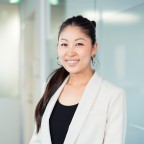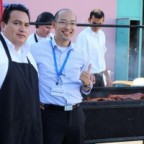“I think of it like a new world is coming in through that door, rather than a customer.” That is what the owner of the café told us in the end, and it is one of the most memorable things anyone has ever told me.
My mother and I had lunch in Jiyugaoka that day, and the old wooden signboard of the café that read “六文銭(Rokumonsen)” caught my eyes. It clearly stood out from the rest of the street, with a McDonald’s and other cafes going after the current pancake craze. I peeked in through the window of the wooden door. Although I was curious too, I was hesitant to go in. It was fairly dark inside, and from what I could see from the dim lights, all the walls were covered with ancient masks. The atmosphere seemed a little spooky, yet had a magical allure to it. My mom was not so enthusiastic about going in either, but my curiosity got over me and we went inside for a cup of tea.
The interior of the café was quite ordinary, with a counter in the middle and a few tables that could seat two or four people. I wanted to ask the owner about the masks, but my first impression of him was very quiet and stern. Indeed, he only asked us what we wanted to drink, and then went on watching TV behind the counter. My mother and I chatted with each other for a while, until I took a stab at asking him the story behind the masks. The owner glanced up from the counter and there was this short, nervous moment.
“Well, it’s a long story,” he said with a shy smile, but he went on telling us anyway. My image of a quiet looking old man was blown away from there. He was a great storyteller. What we expected to be a short stay at a somewhat unordinary café turned out to be a fascinating two-hour adventure.
As much as I want to get into the story of the owner, the point is that you shouldn’t let a first impression get the best of you. The image of the café before I turned the knob and after was completely different. My assumption of a quiet, stern person turned out to be a cheerful and funny storyteller. This encounter led me to think about why a lot of people tend to assume certain things and how it is restraining us from exploring more.
One of the things I questioned was the usage of the Japanese word, “ギャップ,” a word used when something is different from what we expected. It is used commonly when we talk about people’s personalities. When I really think about it, I realize how the usage comes from our expectations about the individual’s personality based on our own impression. Why do we think of it as a “ギャップ”? What did we expect in the first place? I use this word sometimes, too, but these comments could be seen as offensive stereotypes in some situations.
“You’re a returnee? I would have never guessed if you didn’t tell me!”, “You danced in high school? ギャップだね! (That’s so unexpected!).” I have gotten these a lot in university, and although I’ve never been offended by it, it does make me wonder. “So what kind of image do you have about returnees from abroad and dancers in the first place?” Some Japanese people still have a certain image of returnees having wavy long hair, speaking up a lot, and not being able to read between the lines sometimes (such as not using the honorific language to elders.) In short, there are still images that those who lived abroad for a long time don’t fully understand Japanese manners or rules. For some people, those who dress in flamboyant clothes apparently seemed more “dancer-ish,” especially when it comes to hip-hop. I think some people have these images from TV stars or people they have met in the past. I have straight, undyed hair, I like simple clothes and I’ve never really been the type to speak up a lot. My personality probably did not fit what they expected to see in a returnee or a dancer. A friend I have who fits this particular image of a returnee (other than not being able to use the honorific language) has never lived abroad. However, she told me a lot of people tell her she looks like she can speak English very well.
These little examples show us that a variety of sources in society embeds us with particular images of people or things. It easily becomes the base of our stereotypes and assumptions. Sometimes, it comes from one experience we had. People tend to apply it to other people or situations without deep thought that it could be different.
Of course, I am not putting myself out of this picture. In the past, I have thought that I had more understanding of diversity from my experience living abroad. I even thought that I did not have many stereotypes about others. However, I was wrong. Studying abroad in Canada in my 3rd year of university, I realized that I had my own stereotypes. One of the examples was asking “Where are you from?” to a lot of the Asian students I met at the university. Although there were many exchange students, I realized that there were also many third and fourth generations of Asian immigrants. They were born in Canada and grew up there. Some of them had never been to their parents’ home country or spoken their parents’ mother language. The scary part is, it felt natural asking that question until several of the Asian students told me they were born there. None of them seemed offended by it, but I felt ashamed afterward. I felt it was a stereotype that I assumed all the Asian students were exchange students coming from other countries like me.
This experience made me think about a class I was influenced by in university. It was a tutorial about the theory of microaggressions by Professor Deguchi Makiko. Microaggression is the term used for words and actions that unconsciously or indirectly discriminates or has a possibility of hurting people of certain groups or cultures. We watched a video about people who live in Japan who came from other countries and the microaggressions they have experienced. One man talked about how people at his workplace often asked when he had to go back to his home country. He felt like no matter how long he lived in Japan, his Japanese colleagues will not see him as one of them, and he was forever a foreigner. Another man felt irritation toward compliments such as “You speak such good Japanese!” or “You use chopsticks so well!” He has lived in Japan for decades with a Japanese partner.
I understand most of the people who said these comments meant well. What is taken as offensive depends on each individual’s perception. I think we don’t have to be too sensitive about it, but the kind of meaning that lies behind what we say is worth thinking about.
This is not just about other people. Whether good or bad, a lot of people tend to judge about a lot of things in our lives. For example, about people of other nationalities or religions, gender, sexual minorities, individual personalities, jobs, and even about ourselves. Social values and the environments we grew up in also shape how we see ourselves and influences the idea of what we should do. It could be a pressure to fulfill the expectation of a “good mom,” both working and taking care of the children perfectly. It could be a social ideal to lead a stable life, getting a good job after graduating a famous university. It could be judging what you are capable of doing when you actually have the potential to do it. These sorts of ideas put us in a small bubble that limits us from what we really want to do and shuts out the variety of choices we can choose from.
A friend I made at my part-time job told me about her struggles until she was able to think out of the box about her future. “My mom was a really conservative person,” she told me as we waited for the train to come after we finished work. “But when I knew that I really want to be an actress, I freed myself from the expectation my mom had on me, and the sense of duty I had on myself to follow her wishes. Now I feel like I should do whatever I want to, as long as it doesn’t hurt or cause trouble to others.” She is now in an entertainment agency, acting in small plays and auditioning for new ones every now and then, working part-time when the rehearsals are not so busy. I had asked her if she could sell me tickets to her next play. She nodded with her lovable smile.
I have met a lot of people like her throughout my university years who were going after what society tends to think of as the unconventional. It has challenged me to stop hesitating to try something I want to. I tend to think too much about what I “should” do for my future, or thinking I don’t have the capacity to do something. Until I really got myself to scribble ideas on a piece of paper, I felt like I was not the kind of person for writing. Once I pushed myself a little harder, I realized there were more things I’ve wanted to say than I imagined.
“Did you collect these masks on your own?” The one question I asked took us on a magnificent adventure of the owner of the café. Working at a publishing company in his early days, he flew to many countries across Africa and Southeast Asia with archaeologists. He had gone along with them for research to write their paper, later published as books. In the end, they had given the masks to him, saying “It might as well be shown to other people, rather than being locked up in a lab.” After retiring from the company, he started the café as a hobby, and it has continued for 35 years now. He said it doesn’t make a lot but as long as he had enough to live, he didn’t need so much money.
The door to this café was a door with an unexpected surprise on the other side. I think our lives are like a corridor of millions of doors, waiting to be opened and explored. However, the stereotypes or assumptions we have may be leaving a lot of them unopened.
I think the most important thing is being aware that we may have certain judgments about others and ourselves. This will help us question and take a step further in trying to understand somebody or trying something you hadn’t done before. Throughout my 4 years of university, this was the biggest lesson I repeatedly learned. As an English department student, I want to put importance not only on improving my English and understanding about other cultures, but being able to enjoy the difference between others and jump into worlds that I thought would never relate to me. When we become more open to different perspectives and explore other worlds, the more we realize there is no right way or right answer about most things. Do not let the values you grew up with take control of you.
Ayaka Yamaguchi is a fourth-year student in the Department of English Studies. She has served as a writer and Senior Editor for Angles, the writing journal the Department of English Studies since its inception. This essay originally appeared in the 3rd issue of Angles.


















